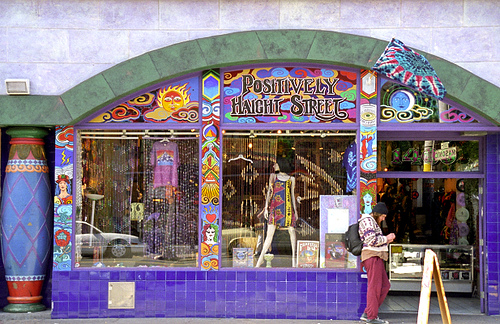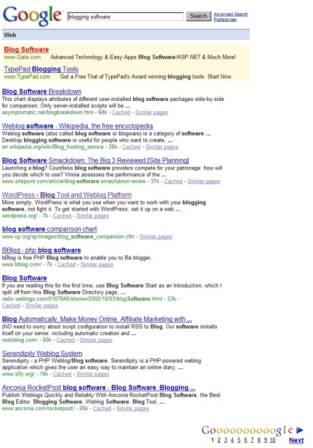
Photo Credit:
David Paul Ohmer
B. L. Ochman recently wrote a post titled
Should Every Company Blog? Hell No!
While I understand her logic that the larger corporations need to think about this very carefully (she deals predominantly with Fortune 500 companies), my take is, if you’re a smaller business, especially a bricks and mortar business – Hell Yes!
Most small businesses don’t have a Web presence. This is largely due to the misconception surrounding blogging in general, and the misconception of the costs and tech skills needed. But, the Web is moving forward at such an amazing pace, that every small business today can have a site up and running within hours – for minimal cost.
This article is the first in a series about small business blogging. I want to try and convince you to at least take the time to understand blogs better, and show you how useful they can be to your business.
Over the next few weeks I’ll talk more about creating a blog plan, the software/designs available, what to include, where to get content ideas from, how to generate traffic, and how to make sure you really start a conversation with your customers. Today, I just want to talk about why blogging is so important.
Small Business Blogging – A Must!
Blogs today are nothing like the blogs of five years ago. Today, some blogs even look like traditional Web sites, so much so, that recently, after showing a blog to an administrator at a local elementary school, she replied: “Oh, no, that couldn’t possibly be a blog; blogs are just for people who want to talk about what they ate for breakfast.” (And I live in Silicon Valley.)
Blogs have matured. Just take a look at some of the biggest sites out there – all of them running blogs:
Wall Street Journal (Hi
Walt),
New York Times – (Hi
Jeremy)
Harvard – none of them talks about bacon and eggs, or their cat; they do however, provide really useful information.
But why should a small business have a blog? Because it is a LOT easier to create than a traditional Web site – and in today’s world of all things Internet, you know you need an online presence.
Picture it:
We moved to Silicon Valley over two years ago. I hate shopping. When I shop, I want to buy what I like, when I like – in and out – no more than half an hour. I don’t like walking from store to store, or spending a day in a mall – ugh!
My taste in clothing is very simple. I like Indian inspired clothing. In Australia, I knew exactly where to find this stuff; here, it’s driving me nuts. It took nearly two years for me to find one store that had this type of clothing. What I couldn’t understand was if the owner had spent a day setting up a site, I could have found her years ago, and given her much of my hard earned cash.
I asked her about it. She said she wants an online presence, and she knows she needs an online presence, but she just doesn’t know how to go about doing it easily and with minimal cost. Well the answer to that is – blog. Sure, it will take a day or two to put it together, and an hour or so a day to maintain it, but the benefits can be huge – no better free publicity for her store!
Over the past few months, I’ve been helping people start blogs. And although their reasons vary, the bottom line for all of them is they want an
online presence that is cost effective.
Blogs are cost effective
If you hire a programmer to build a Web site it is going to cost you anything from $2,000+. The biggest problem (other than cost) is you need to pick a great developer, one that has some SEO knowledge, and basic design skills. If you don’t, you might get a really nicely coded site, but it may look a shocker to your visitors – and it may not get the Google juice you’re after.
Your option then, is to hire a designer to make it visually attractive (add another $2,000), an
SEO/SEM firm that can get results (most of the reputable start at over $10,000), and a
brilliant copywriter; someone who knows how to write copy that sells (add at least a couple of hundred per article).
So, as you can see, with a traditional Web site, the costs are huge just to set the thing up; let alone maintain and update it.
With a blog, your biggest costs are the domain name [$10] and hosting [$50-100/year]).
If you use
WordPress software, your code is free. You won’t need a developer to write the code, it’s already written, ready to go. You don’t need a designer. If you choose to have
WordPress host it for you, they have in excess of 60 designs to choose from; if you host your WP site yourself, there are hundreds if not thousands of
designs ready and waiting for you.
Blogs get you into search results quickly
While optimizing your site to ensure you turn up in Google’s results page can be a costly and time consuming effort, most small businesses are not that concerned with keywords –yet. Right now, they just want to turn up in search results when someone types in their name or business name.
Blogs, unlike traditional Web sites are updated frequently, and Google likes nothing more than fresh content – so getting into search results requires no great effort from you. If you name your site well, and ensure your name is associated with it, you will appear in Google’s results within the day, if not the hour.
I have done very little to optimize this blog, but go to Google, type in
blogwell and you should find this site pretty easily.
If you’re a small business that only wants an online presence, one that lets you showcase your products/services and lets you interact with customers, blog well and blog now. It just makes good business sense.
Many businesses fail when it comes to blogging because they don’t spend time planning before they jump in. Don’t be one of them. Read the second article in the blog well series:
The Blog Plan
This is the first in a series of posts about how to blog well. If you’d like to see the next two, you can find them here:
Blog Well Files – Part 2: The Blog Plan
Blog Well Files – Part 3: Choosing a Blogging Platform
Blog Well Files – Part 4: Creating a Blog Strategy
If you have found this post useful, please consider subscribing to my
feed











